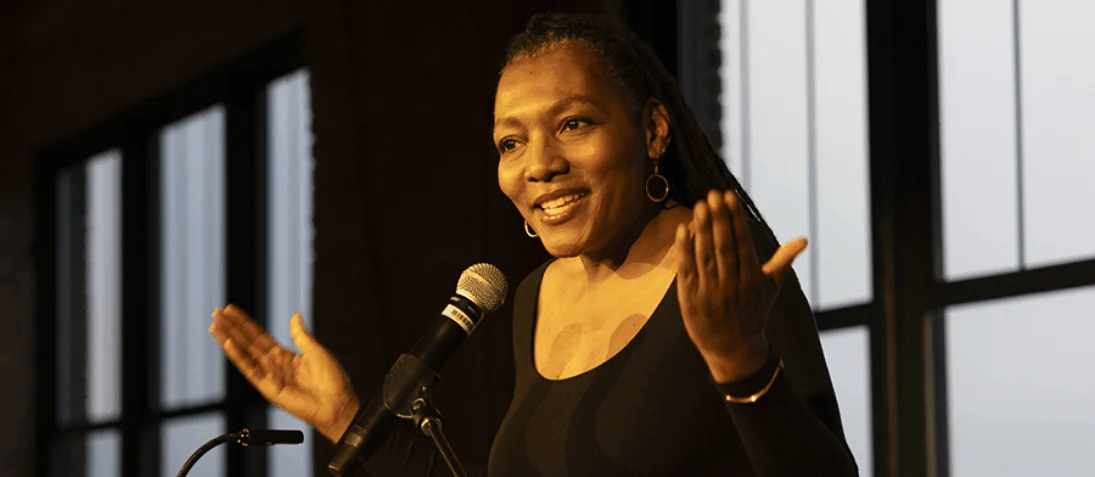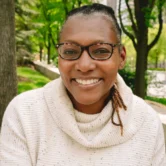
President & CEO reflects on her leadership
June 10, 2025
June marks my fifth anniversary as president and CEO of the Shriver Center on Poverty Law, but it feels like a lifetime ago, or like it happened on an alternate timeline. COVID had brought the world to a halt that March of 2020. We were still months away from the first vaccines. But it wasn’t the world-historic pandemic that stopped me from commuting to work on my first day. It was then-Mayor Lori Lightfoot’s orders to close the bridges along the Chicago River, in an effort to contain the George Floyd protests. Floyd, a Black man, was murdered the week before at the hands of a white Minneapolis police officer, spurring a nationwide uprising that remains unparalleled to this day. Getting to the office, quite simply, was not possible. With the city in crisis, I met my new team on a Zoom call, dialing in from my bedroom rocking chair.
Before the world turned sideways, I thought I knew what I was stepping into. As the chief executive, I imagined — perhaps naively — that I’d spend my time vision casting the Shriver Center’s future, both infrastructurally and programmatically. The rest of the job would be divided between administrative and fundraising responsibilities, and the stewardship of an internal culture where all staff felt appreciated and invested in the mission.
I quickly learned that carving out time for big-picture strategizing will always compete with the essential, everyday demands of leading a national nonprofit, even in “normal” times. My challenge stepping into the new position was to walk that tightrope amidst the collision of two transformative forces shaping history in real time.
My first concern was the team’s health and safety, without which we couldn’t do this work. The next step was to lean into the calls for racial justice and accountability. There was a palpable thirst for knowledge about the legacy of systemic racism and strategies to dismantle it. The Shriver Center swiftly responded with a roster of racial justice-oriented trainings that deconstruct the prevalence of white supremacy in American life. Our courses remain popular to this day, and we continue to connect our graduates through our legal networks and convenings.
With the help of my incredible team, the Shriver Center effectively navigated that challenging period, but this wasn’t the first time I watched the organization adapt to changing political headwinds. In the late 1990s, I landed my first job out of law school at what was then called the National Center on Poverty Law (NCPL) — one of our previous names before deciding on our current one. Federal funding for legal aid was being greatly restricted under President Bill Clinton, who proudly declared he was ending “welfare as we know it.” As a young lawyer, I watched NCPL transition out of federal funding toward foundations and grants, a move which allowed us to continue our advocacy work. It was a huge risk, but the gamble paid off. Some 20 years later, having returned after stints in politics, higher education, and as executive director of the League of Women Voters of Illinois; the Shriver Center had grown substantially.
Despite undergoing significant changes in those intervening years, the organization has remained true to its mission summed up in our mantra that “poverty is a policy choice.” Our job is to fight for better choices and durable solutions. In my five years as president and CEO, the Shriver Center has won a number of critical victories. Illinois workers can now earn up to five days of guaranteed paid leave annually to use however they choose. We pushed hard to create Medicaid-like coverage for immigrant adults in Illinois because sickness doesn’t care about your legal status. Our work on guaranteed income — programs that provide direct cash payments to people who need it — reflects our core commitment to empowering people by giving them the resources to manage their own affairs.
As the organization’s first Black woman to serve as president and CEO, issues of justice are both professional and personal to me. When my judgment is called into question, I often wonder whether it’s a racial or gender microaggression. It could easily be both because I hold two marginalized identities. Any discomfort felt by white leaders in addressing inequity at work pales in comparison to what leaders of color endure in every aspect of life. When it comes to fundraising, I’ve also found that nonprofit executives of color must work twice as hard to cultivate donors because many of us aren’t born with the built-in advantages that put us at close proximity to elite circles.
Racism is baked into our institutions and even nonprofits like the Shriver Center. The right wing has learned how to exploit racial divisions and drive a wedge between people of all identities who struggle to get food on the table. When I first started out, politicians and pundits talked about “welfare queens,” a coded term meant to evoke the myth that Black women somehow lived luxuriously off government handouts, even though the majority of Americans receiving federal assistance are white. Then came political correctness. Next was critical race theory. Now the dog whistle du jour is “woke.” All are deployed as a pretext to slash crucial government programs and protections for marginalized people.
At this critical junction, a key challenge for leaders in this space is to show that when we demonize one group, nobody is safe. The Trump administration is rounding up immigrants without warrants. If they get away with it, the next community could be yours.
When we cut an essential program like Medicaid, the repercussions won’t be felt by recipients alone. The lack of Medicaid reimbursements will force hundreds of hospitals in rural communities to close, depriving people of necessary care and taxing the entire medical system. Many towns will lose their economic anchor. People will be sicker. Some will be unable to work.
Undoubtedly, our founder Sargent Shriver, an architect of the War on Poverty, could never have predicted the many permutations we’ve undergone as an organization, the many historical events we’ve survived, or the victories we’ve won. Despite the peaks and valleys, his vision to harness the power of lawyers to fight poverty and racism has remained a constant.
It’s my job to uphold his mission through strong governance and vision. I will consider myself a success if I leave this organization stronger than it was five years ago. We need the Shriver Center, and our allies in this work, to be ready not just to fight our enemies’ worst attacks but to move the needle toward justice.
